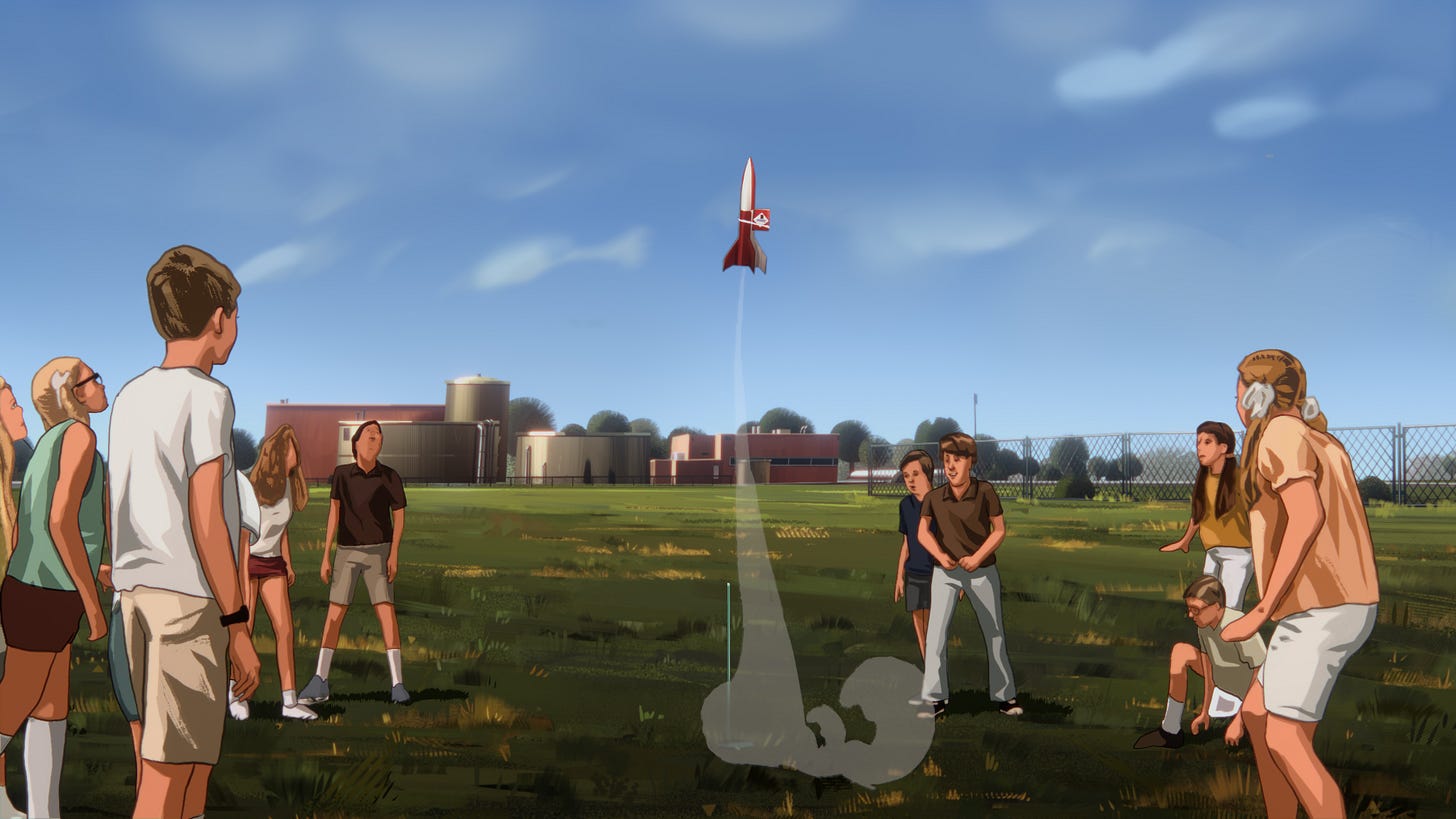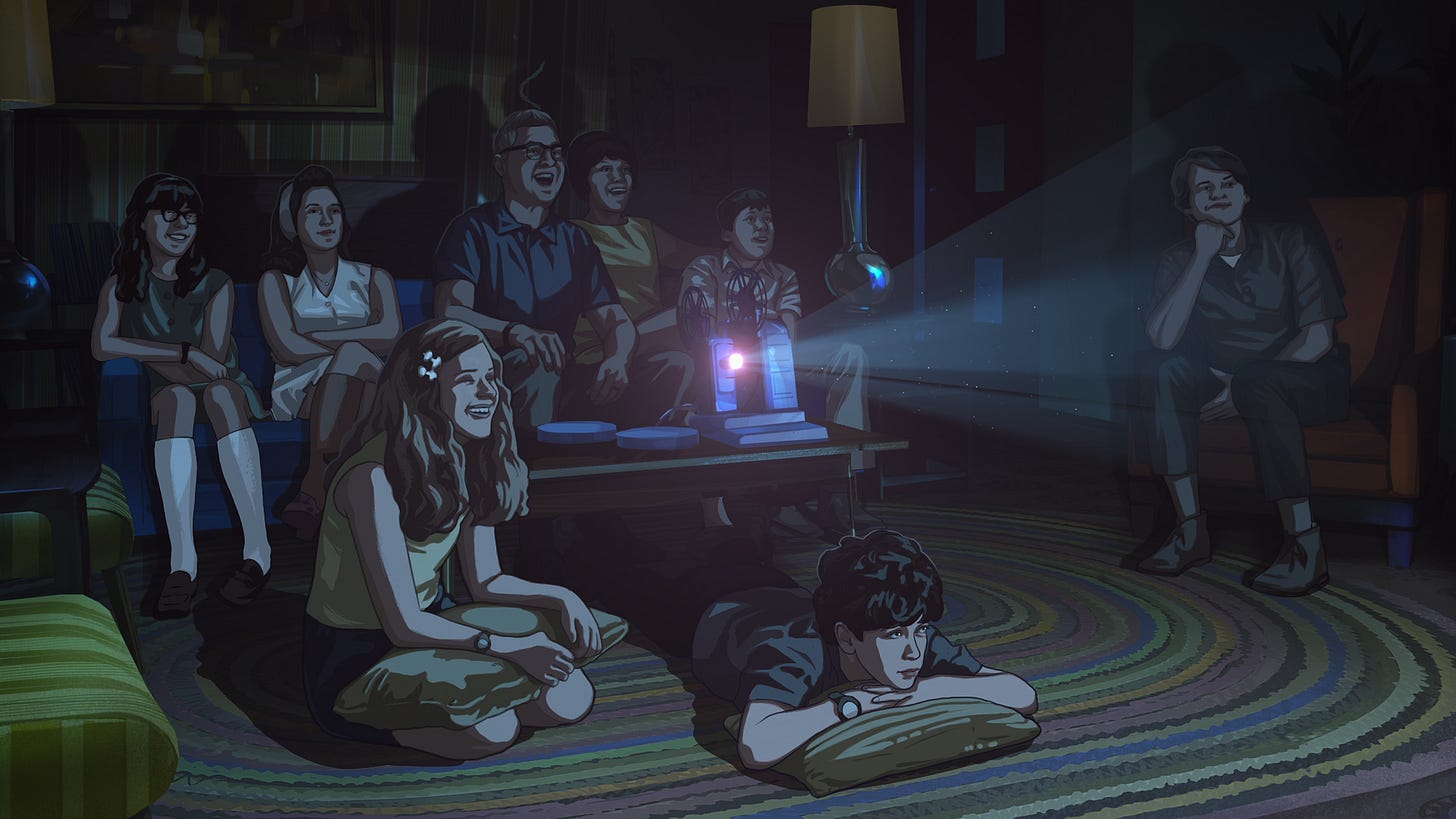What to Watch This Weekend: "Apollo 10 1/2"
Plus: Another, not-so-nice Netflix Original, "The Bubble"
The Nut Graf: Richard Linklater recreates an animated 1960s childhood in the charming, nostalgic “Apollo 10 1/2” (on Netflix, *** stars out of ****); “The Bubble” (on Netflix, * 1/2 stars out of ****) is a torturous quarantine comedy.
You’ve heard of a Proustian madeleine? “Apollo 10 1/2” is a Proustian Space Food Stick. It arrives on Netflix today courtesy of Richard Linklater, who to my knowledge has yet to make a bad film. (Checks notes: OK, “Where’d You Go, Bernadette?” from 2019, and while I know there are people out there who don’t like “Boyhood,” I don’t want to hear about it.) The new movie, which is animated in the Rotoscoped style of the director’s “Waking Life” (2001) and “A Scanner Darkly” (2006), is subtitled “A Space Age Childhood,” and for any and all of us who came of age as Late Boomers, born between 1957 and 1964, it is as precisely focused a nostalgia trip as you are ever going to find.
Did your childhood landscape include the following: Jiffy Pop, 45 rpm singles (and their little yellow plastic spindle adaptors), “Mouse Trap,” “Dark Shadows,” the theme to “The Dating Game,” “The Wizard of Oz” once a year on TV, “In The Year 2525” and “Grazing in the Grass,” ironed hair, prank calls, Sugar Frosted Flakes, transistor radios, duck and cover, Saturday morning cartoons? Do you hear the words “Overture, curtain lights” and are able, nay, compelled to sing the rest of the song? Boy, do I have the movie for you.
Linklater was born in 1960, and “Apollo 10 1/2” is a fictionalized memory play of growing up in the suburbs of Houston, Texas, set in 1969, the year of the first Apollo moon landing. The director’s stand-in is a kid named Stan (voiced by Milo Coy, with a comparatively subdued Jack Black serving as the grown-up narrator), who’s normal in all respects except perhaps for his gift for spinning tall tales. One of his, um, lies becomes a running fantasy throughout the film: That Stan has been recruited by NASA on a secret mission to test out the equipment and land on the moon before the Apollo 11 astronauts do (thus the title). Why do they need a child? Apparently, they built the Lunar Excursion Module too small. “Stan, you’re our only hope,” plead the Men in Black in the kind of daydream that’s perfect for settling into during a long, slow math class.
Those fantasy sequences start the film and periodically return, arguably wearing out their welcome. Otherwise, “Apollo 10 1/2” is a thick catalogue of late-60s childhood: “The Shakiest Gun in the West” at the drive-in, hippies up at the campus, greasers down at the bowling alley, older sisters possessing strange and alluring albums by groups with names like the Jefferson Airplane. Younger sisters who won’t stop playing “Sugar, Sugar” by the Archies and long Talmudic debates about who is the best Monkee. Disney’s “The Wonderful World of Color” on Sunday nights, the last gasp of the weekend before school on Monday. At times the animated screen is crowded with memorabilia: Baseball cards, LP covers, board game boxes. (“Go to the Head of the Class” – man, I’d forgotten about that one.) Linklater has earned my undying respect if only because he and I are the sole people on earth who remember a short-lived sitcom called “It’s About Time,” about astronauts who travel back to the Stone Age. (It co-starred Imogene Coca and Joe E. Ross!)
There’s not much of a plot, other than the year’s slow run-up to the moon landing. Rather, “Apollo 10 1/2” observes the way American pop culture made itself over in the style of a sleek imagined future. This was especially true if you lived within NASA’s orbit and had friends whose fathers and mothers worked there. (Stan’s own dad, voiced by Bill Wise, runs the Agency’s procurement department, which Stan finds woefully unexciting.) There are rocket slides at the playground and car salesmen in space suits on TV; the nearby amusement park is Astro World and the brand new baseball stadium is the Astrodome (which is filled with Astroturf). In a few years we’ll all be living on Mars, so how can tomorrow not be great?
Still, dissonant noises from the outside leak into this complacent Boy’s Life. They come through the TV: the war in Vietnam, assassinations, Black people wondering why we’re spending money to go into space when there’s so much need on Earth. Sometimes they’re right in the house, an older sibling pushing back against parental limits and politics. If you’re the right age, this too will seem familiar – the anxiety awaiting at the threshold of adulthood. I remember lying awake in 1969, at the age of 12, and worrying about the draft coming to get me in six years. But the film is also a cherished Polaroid of that time in a kid’s life when they could fall asleep on the drive home from the movies, knowing they’d wake up in their own bed.
“Apollo 10 1/2” isn’t much more than this, a distillation of a very particular time and place in Richard Linklater’s memory and in our shared American experience. I often felt as if I were looking at my own childhood through a long and distant lens. I can’t imagine what the average Gen-Z moviegoer might make of this movie, stuffed as it is with cultural references from before the dawn of time. But they can go make their own Magic 8-Ball of memory, and surely will someday. This one’s ours.

Must Avoid of the Week: “The Bubble,” also premiering on Netflix, looks like a good deal, right? A new Judd Apatow comedy about egotistical movie stars trapped in a pandemic-quarantined film set, with a cast that includes Keegan-Michael Key, David Duchovny, Karen Gillan from “Guardians of the Galaxy,” Leslie Mann, Kate McKinnon of “SNL,” Rob Delaney (TV’s “Catastrophe”), Maria Bakalova (“Borat Subsequent Moviefilm”), and a raft of starry cameos. It has to be pretty good, no?
No. Imagine you took your family and a bunch of vaccinated friends to an AirBnB in the country to get away from it all, and while you were there, you decided to put on a show. That’s exactly what “The Bubble” feels like and quite likely is. (Daughter Iris Apatow is in the cast, and Mann, of course, is Mrs. Judd Apatow.) The gag is that the stars of “Cliff Beasts 6,” a “Jurassic Park”-style sequel in what we’re told is “the 23rd most successful action franchise of all time,” are imprisoned in the English manor that serves as home and soundstage until they finish making the movie. Lockdowns alternate with bad green screen; the actors grow desperate and then mutinous. The problem is that the Apatows appear to have packed everything except a script; according to the credits there is one, but it’s mostly a template for frenzied, unfunny improvisational riffs. None of the characters are likable, which can work if the satire is razor-sharp and observant, as it is in, say, “The White Lotus,” another project that locks the audience in a hotel with entitled jerks. “The Bubble,” by contrast is blunderbuss parody and over two hours of it. You have been warned.
A better weekend bet might be the double bill of Redford and Newman on Turner Classic Movies this Saturday afternoon: “Butch Cassidy and the Sundance Kid” (which came out in 1969, so Stan and his family probably saw it) at 3:45 p.m. and “The Sting” (above) at 5:45. While you’re at it, why not sit the kids down for a lesson in sheer star chemistry?
On Sunday at 1:45 p.m., Turner Classics is showing Charles Vidor’s “Love Me or Leave Me” (1955), which has what’s easily Doris Day’s finest dramatic performance, as 1920s singer Ruth Etting. A fearsome Jimmy Cagney plays Marty “The Gimp” Snyder, Etting’s mobster boyfriend, and the movie is psychologically astute and way ahead of its time in its portrait of a toxic, abusive relationship.
If you enjoyed this edition of Ty Burr’s Watch List, please feel free to share it with friends.
If you’re not a paying subscriber and would like to sign up for additional postings and to join the discussions, here’s how:
If you’re already a paying subscriber, I thank you for your generous support.







